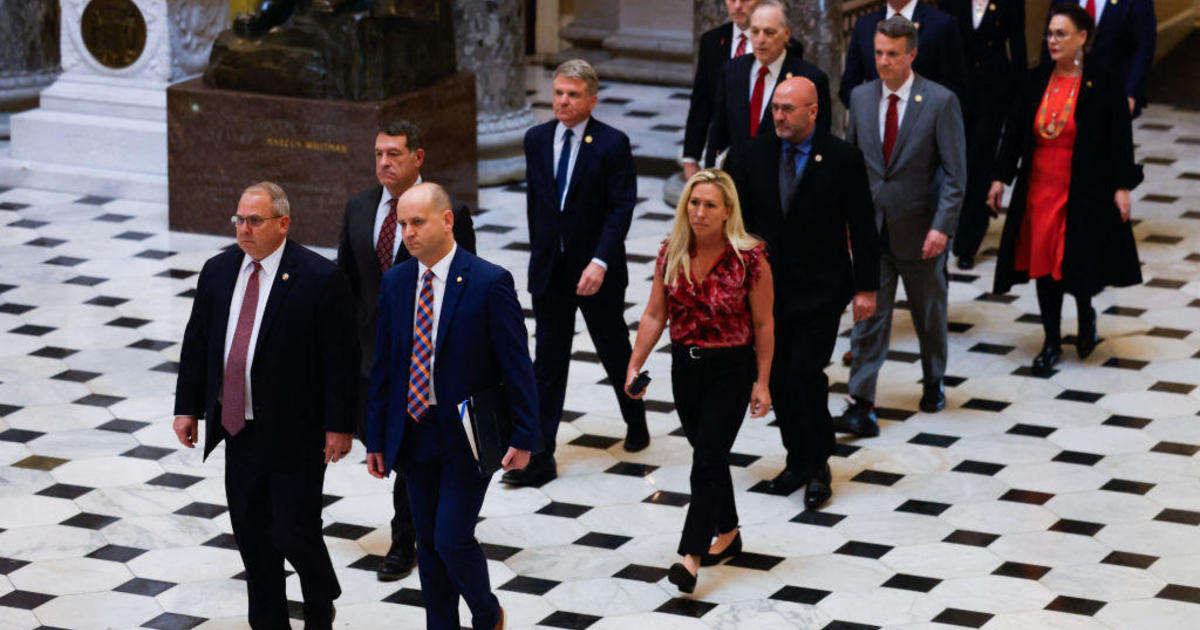Mulvaney drops effort to join lawsuit over impeachment testimony
Washington — Acting White House chief of staff Mick Mulvaney has withdrawn his request to join a federal lawsuit over whether White House officials should comply with congressional subpoenas for testimony in the impeachment inquiry, indicating he plans to file his own separate case.
On Saturday, Mulvaney asked to join the suit filed by Charles Kupperman, a former deputy national security adviser under John Bolton. Kupperman asked the court to decide whether he should comply with a congressional subpoena for testimony or follow a White House order not to appear before the committees leading the impeachment inquiry. Kupperman shares an attorney with Bolton, who has declined to testify voluntarily but has not been subpoenaed.
Mulvaney was issued a subpoena to appear for a deposition last week, which he ignored. His attorney filed a motion asking to join the lawsuit in the U.S. District Court for the District of Columbia over the weekend, and Judge Richard Leon held a telephone conference regarding Mulvaney's motion on Monday.
House Democrats said they were withdrawing Kupperman's subpoena last week and urged the court to dismiss the suit, arguing a similar case involving former White House counsel Don McGahn would be resolved sooner.
Mulvaney's decision to refile the suit came after attorneys for Kupperman and the House both told the court Mulvaney should not be allowed to sign on to the effort.
In a filing Monday afternoon, Kupperman's attorney Charles Cooper argued that Mulvaney "has made it clear that he supports the Executive, and he accordingly seeks declaratory relief against only the House Defendants." Both the House and President Trump are named as defendants in the suit.
"President Trump, represented by the Department of Justice, will vigorously champion Mulvaney's interest in the President's assertion of absolute immunity overriding Mulvaney's obligation to appear and testify in response to the House subpoena," Cooper wrote.
Cooper said Mulvaney has "publicly discussed the events at issue in the House's impeachment inquiry, including appearing to admit there was a quid pro quo relationship" between a delay in military aid to Ukraine and the country opening investigations, referring to a White House briefing with Mulvaney in October. Cooper also said Kupperman's status as a former official means the court's decision might not be applicable to Mulvaney, who remains a White House employee.
Cooper argued that Kupperman's role as an adviser solely on "highly sensitive" national security matters differs from Mulvaney, who advises the president on a range of subjects.
"If any close personal advisor to the president qualifies for testimonial immunity, it surely must be [Kupperman]," Cooper wrote.
House Democrats filed their own motion opposing Mulvaney's inclusion in the lawsuit, arguing that the case is moot given the withdrawal of Kupperman's subpoena. But even if it isn't, they argued, Mulvaney is "differently situated from Kupperman in several important respects" that mean his attempt to join the suit should be denied.
"Unlike Kupperman, Mulvaney does not state that he would comply with his subpoena if this Court rejects the claimed absolute immunity," the House's general counsel wrote. "And, unlike Kupperman, Mulvaney remains subject to a subpoena that has not been withdrawn."
Clare Hymes contributed reporting.



